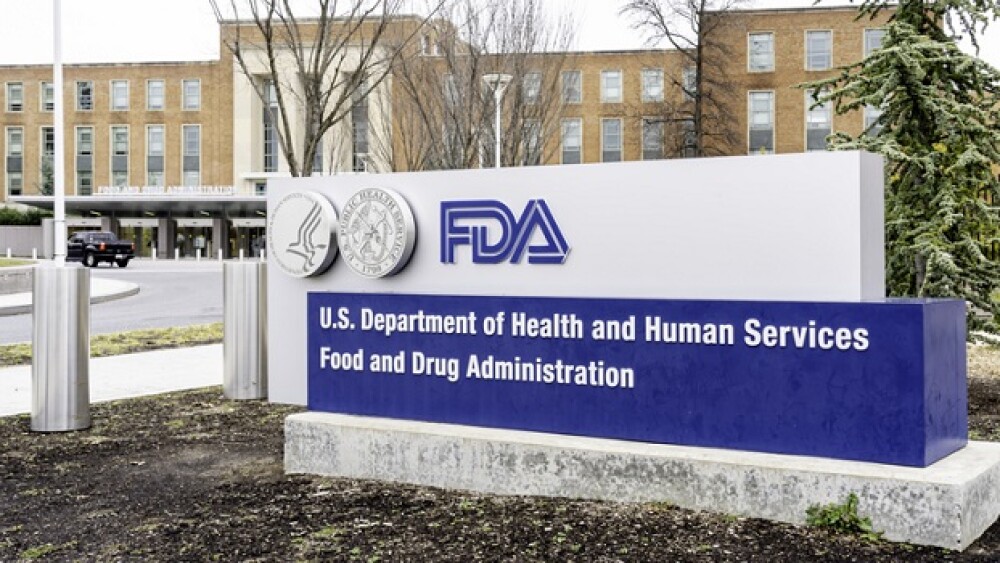The regulator greenlit 55 new drugs last year, seven of which belonged to Pfizer, including an ulcerative colitis treatment and a migraine nasal spray—both acquired in multibillion-dollar buys.
Pictured: FDA sign outside its headquarters/iStock, JHVEPhoto
The FDA approved 55 new treatments in 2023, representing a nearly 50% increase from the year before, hitting its highest number of approvals since the COVID-19 pandemic.
According to data from the Center for Drug Evaluation and Research (CDER), the FDA greenlit only 37 new drugs in 2022, down from 51 in 2021, 53 in 2020 and 48 in 2019. The agency hit a regulatory peak in 2018, approving 59 new drugs that year. Prior to 2022, the regulator last hit a low in 2016, when only 22 new drugs were approved.
Pfizer emerged as last year’s regulatory victor, securing seven FDA nods for novel drugs, excluding vaccines, label expansions and approvals for combination regimens with other therapies. According to an analysis by Fierce Pharma, Pfizer won more than twice as many approvals as any other company in 2023 and over each of the last three years.
The pharma giant’s regulatory haul includes Velsipity (etrasimod), approved in October 2023 for the treatment of moderate to severe ulcerative colitis. The oral S1P receptor modulator joined the Pfizer fold in December 2021, when the pharma bought Arena Pharmaceuticals for $6.7 billion.
Pfizer cashed in on another multibillion-dollar bet in March 2023, when the FDA approved the nasal spray Zavzpret (zavegepant) to treat migraine in adults. The pharma acquired Zavzpret, a small molecule CGRP receptor antagonist, from its $11.6 billion buyout of Biohaven.
Though not part of CDER’s list, Pfizer also won the FDA’s approval for its respiratory syncytial virus vaccine Abrysvo in June 2023, a month behind its main competitor GSK.
Outside of Pfizer’s impressive tally, the FDA also greenlit several big-ticket treatments in 2023 including Eli Lilly’s obesity treatment Zepbound (tirzepatide), approved for chronic weight management in November 2023. Lilly now joins Novo in forming a virtual duopoly dominating over the lucrative weight-loss market.
The FDA in 2023 also approved Eisai and Biogen’s Alzheimer’s treatment Leqembi (lecanemab), granting it accelerated approval in January before converting it to full approval in July. Following traditional authorization, which opened up Medicare and Medicaid coverage for the anti-amyloid antibody, the partners have reported a dramatic increase in patient uptake.
Toward the end of 2023, the FDA also gave back-to-back approvals to two gene therapies for sickle cell disease—one for bluebird bio’s Lyfgenia (lovotibeglogene autotemcel) and the other for Vertex Pharmaceuticals and CRISPR Therapeutics’ Casgevy (exagamglogene autotemcel). Casgevy is also being reviewed for transfusion-dependent beta-thalassemia, with a verdict due on March 30, 2024.
However, capping off the busy year of approvals were a trio of rejections. On Dec. 21, 2023, the FDA handed Merck a Complete Response Letter for its chronic cough drug gefapixant, citing lack of “substantial evidence of effectiveness.” A few days later, the regulator likewise rejected Zealand Pharma’s dasiglucagon for children with congenital hyperinsulinism and Amgen’s Lumakras (sotorasib) for KRAS-mutated non-small cell lung cancer.
Tristan Manalac is an independent science writer based in Metro Manila, Philippines. He can be reached at tristan@tristanmanalac.com or tristan.manalac@biospace.com.






